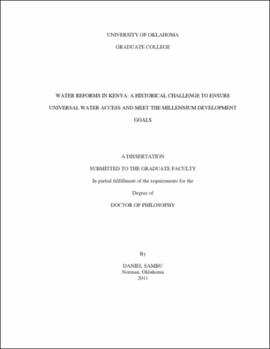| dc.contributor.advisor | Tarhule, Aondover | |
| dc.creator | Sambu, Daniel | |
| dc.date.accessioned | 2019-04-27T21:38:47Z | |
| dc.date.available | 2019-04-27T21:38:47Z | |
| dc.date.issued | 2011 | |
| dc.identifier | 9946823302042 | |
| dc.identifier.uri | https://hdl.handle.net/11244/319246 | |
| dc.description.abstract | Access to water is a key issue for developing countries. Kenya is one such country in which water scarcity and a poor water infrastructure compromise the health and standard of living of the population, and hinder its economic and social development. Despite a long history of attempts to reform the country's water sector and improve water resources management, a large proportion of Kenya's population is still not sufficiently served with water for consumptive, sanitation, and productive purposes. This dissertation examines aspects of water reform and access in the country, including the institutional and historical factors affecting the water sector, and the historical evolution of water resources management from the colonial to post-independence periods. The most recent reform (2002) is assessed in terms of its effectiveness in bringing about institutional reform, as well as the operating performance of water service providers in meeting the Millennium Development Goals (MDGs). | |
| dc.description.abstract | The study adopts a case study approach using mixed methods. Specifically, a questionnaire was administered to the newly formed Water Service Providers (WSPs) as well as various water sectors. The performance efficiency of the WSPs was analyzed using data envelopment analysis. The results reveal that continuing duplication of functions across the water sectors, low levels of funding, and corruptions are inhibiting the effectiveness of the restructuring. The greatest challenge in executing the reforms relates to the financing of the whole process. While the relevant policies and institutions have been set up, they lack funds either to support the planned activities, and projects or, importantly, to raise the performance of existing WSPs. The study uncovered that, by pegging its initiatives on global targets and foreign aid, Kenya has changed its policies and institutions to reflect the global trends several times. This has led to weak or lack of continuity in policy, and reform process in the country. Furthermore, linkages among the several agencies dealing with water services remain weak, and water resource policy has not been harmonized with sanitation policy, irrigation policy, and environmental policy. | |
| dc.description.abstract | The study has further shown that while the 2000 reforms have resulted in major gains in policy reforms, significant improvement in water access will not be achieved without addressing the systematic inequalities of water access caused by land alienation during the colonial rule. After independence, most of the land owned by the Europeans was not returned to the natives, but rather bought by the rich or converted to game reserves. In this case, the land tenure system that broadly disenfranchised the local population before independence continues to date. | |
| dc.description.abstract | The study shows that the WSPs created to replace the government agencies in the provision of water services are not efficient and productive enough to meet the MDGs as envisioned by government plan. The implications and recommendations for water sector performance relate mainly to these WSPs. While the companies are still young and need time to mature, some challenges need to be addressed immediately. Many WSPs still lose more than 50% of water as unaccounted-for-water. This is mainly due to a dilapidated infrastructure most of which was developed during the colonial period. Most of the pipeline systems, especially in urban areas, need to be replaced before extending coverage to other areas. In the absence of more (e.g., private sector) funding, this is unlikely to happen. Possible solutions include amalgamating smaller WSPs to increase their scale of operation. The study further outlined how some of the inefficiencies could be mitigated through benchmarking process. Weaker companies should be encouraged to emulate their benchmarked peers within the country, while stronger companies should be benchmarked with stronger companies in eastern Africa. | |
| dc.format.extent | 234 pages | |
| dc.format.medium | application.pdf | |
| dc.language | en_US | |
| dc.relation.requires | Adobe Acrobat Reader | |
| dc.subject | Water-supply--Kenya | |
| dc.subject | Water--Law and legislation--Kenya | |
| dc.subject | Water resources development--Kenya | |
| dc.title | WATER REFORMS IN KENYA: A HISTORICAL CHALLENGE TO ENSURE UNIVERSAL WATER ACCESS AND MEET THE MILLENNIUM DEVELOPMENT GOALS | |
| dc.type | text | |
| dc.type | document | |
| dc.thesis.degree | Ph.D. | |
| ou.group | College of Atmospheric & Geographic Sciences::Department of Geography and Environmental Sustainability | |
